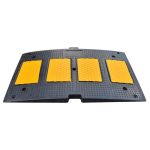Introduction to Plastic Wheel Stops
Plastic wheel stops play a crucial role in parking lots, garages, and various other parking areas. They are designed to prevent vehicles from rolling beyond a certain point, thereby ensuring safety and reducing the risk of damage to other vehicles or structures. Lightweight yet durable, plastic wheel stops provide an efficient solution for property managers and vehicle owners alike.
Advantages of Plastic Wheel Stops
Durability and Longevity
One of the most significant advantages of plastic wheel stops is their durability. Made from high-quality materials, they are resistant to weather conditions, chemicals, and physical wear and tear. This ensures a longer lifespan compared to traditional concrete wheel stops.
Ease of Installation
Unlike their concrete counterparts, plastic wheel stops are lightweight, making them easy to install. They often come with pre-drilled holes and can be secured quickly with bolts. This means reduced labor costs and less time spent in installation.
Cost-Effective Solution
Another benefit of opting for plastic wheel stops is that they are generally more affordable than other materials. Given their durability, they offer an excellent return on investment as they require less maintenance and replacement.
Applications of Plastic Wheel Stops
Commercial Parking Lots
In commercial settings, such as shopping malls and office complexes, plastic wheel stops are used to delineate parking spaces clearly. They ensure that cars park within the designated areas, thereby maximizing the number of available spaces.
Residential Areas
In residential apartment complexes and gated communities, wheel stops can prevent vehicles from encroaching into pedestrian paths or green spaces. This enhances overall safety and preserves the aesthetic value of the property.
Garages and Workshops
Plastic wheel stops are also commonly used in garages and workshops. They help in preventing vehicles from hitting walls or other valuable equipment, thus providing an additional layer of protection.
Maintenance and Care
Plastic wheel stops require minimal maintenance, making them a convenient option for all types of properties. Here are some tips to extend their lifespan:
- Regularly inspect for any signs of wear and tear.
- Clean to remove dirt and debris that may cause deterioration.
- Check the bolts periodically to ensure they remain secure.
Frequently Asked Questions
Are Plastic Wheel Stops Environmentally Friendly?
Yes, many plastic wheel stops are made from recycled materials, making them an eco-friendly option. Additionally, their long lifespan means fewer replacements, resulting in less waste.
How Do Plastic Wheel Stops Compare to Rubber Wheel Stops?
While both materials offer advantages, plastic wheel stops are generally lighter and easier to install. They are also cost-effective compared to rubber options. However, rubber wheel stops might provide better traction depending on the specific application.
Can Plastic Wheel Stops Handle Heavy Vehicles?
Yes, high-quality plastic wheel stops are designed to withstand the weight of most vehicles, including SUVs and light trucks. It is essential to check the manufacturer’s specifications to ensure compatibility with your vehicle type.
Interested in installing plastic wheel stops for your property? Get more information about prices and available options by visiting Unimat Traffic.



